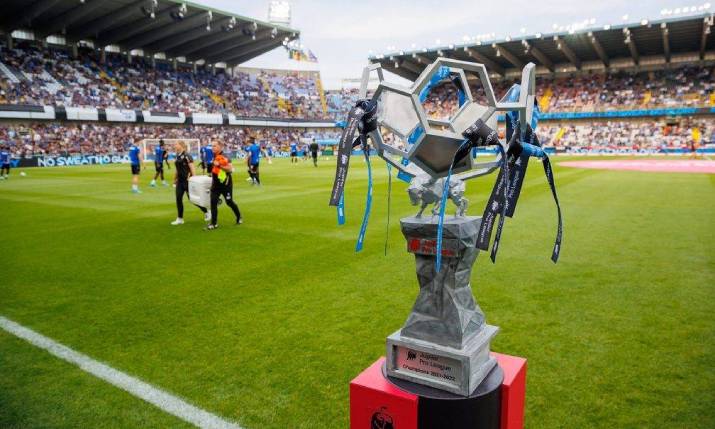Mammoth production: Eleven Sports teams with Proximus Media House to create a sensational broadcast of the Belgian Pro League matchday 34

Proximus Media House, working closely with the Belgian Pro League, was responsible for bringing all seven simultaneous matches on day 34 of the regular season to viewers
Proximus Media House, working closely with the Belgian Pro League, was responsible for bringing all seven simultaneous matches on day 34 of the regular season to viewers
The Belgian Pro League, also known as the Jupiler Pro League, culminated its regular 2023 season with seven simultaneous matches on Sunday 23 April. Proximus Media House, working closely with the League, was responsible for bringing all of these matches on day 34 to Belgian viewers within the country, in a multitude of languages, for the League’s domestic rights partner Eleven Sports, as well as for the world feed.
The Belgian football format means that following the regular season, playoffs decide the championship and which teams will get seeded for the different European Championships. On the last match day of the regular competition, the rules specify that all matches should be played at the same time.
“The matchday 34 Multilive production enables all viewers to experience all matches at the same time, which is only possible due to a close collaboration and planning ahead”
For the 2023 League format, this was potentially going to be nine matches played simultaneously. At a TV production level, this created a massive challenge for Proximus.
It was decided that two matches had no influence on the result and could be played at a different time, so while production was prepared for nine simultaneous matches, the main event was a production of seven matches that would all kick off at 18:30.
Production set up
Being a bilingual country, for every match in the Belgian 1st division three different programmes were produced; one in Dutch, one French, and an international clean feed. In addition to this, three selected matches were also produced in an English programme version for international distribution.
The commentators for the Dutch and the French programmes were located in the stadium and the commentary was mixed inside the OB van at the stadium. However the English commentary was added from a voicebooth at the Proximus master control room (MCR) in Brussels. The different graphics for each language were also added at the MCR.
The OB van at the stadium produced a main and backup feed which was then fed through the award-winning video contribution next generation (ViCoNG) network to Proximus’ central MCR.
This ViCoNG network is a dedicated nationwide video IP network that connects all of the football stadia of the first division in Belgium to the MCR, and also to various broadcasters as well as to the VAR centre based in Tubize, near Brussels.
Using this set up, Proximus can send up to eight production feeds to the MCR and a maximum of 16 isolated camera feeds to the VAR centre. At the same time Proximus can send eight return feeds to the OB van, as well as four additional VAR feeds which were used exclusively for the referees in the stadiums. This entire IP network is based on SMPTE-2110 with full redundancy in place.
A total of 48 cameras were used to cover all these matches, commentated on by a group of 16 Dutch and French-speaking commentators, and two matches in English.

“More than 600,000 viewers enjoyed the multi-live experience of matchday 34 on the Eleven Pro League Channels; amazing numbers”
Added complications
Rightsholder for the day 34 matches in Belgium, Eleven Sports, produced a show called Multilive so viewers could follow all of the action on the different pitches in real time. Whenever something notable happened on one of the matches, the programme immediately switched to it so viewers could catch up and see replays of goals or goal attempts. This show was also produced in two languages using two separate production crews from two production control rooms, also located at the MCR.
Jan Mosselmans, COO at ElevenDAZN Belgium and Luxemburg, comments: “More than 600,000 viewers enjoyed the multi-live experience of matchday 34 on the Eleven Pro League Channels; amazing numbers. This success was undoubtedly the result of intense and efficient cooperation between ElevenDAZN and Proximus Media House, but also with the other partners from the new production ecosystem created around Belgian Football: Mediapro, Woestijnvis, and WTvision.
“The huge audience numbers of the multilive programme is also proof that sports content is being consumed in an increasingly fragmented way. As sports media, we absolutely must respond to this trend,” continues Mosselmans.
Eleven Sports offers 13 linear sports channels to viewers in Belgium, and also provides an over the top (OTT) platform for watching online. For matchday 34, Eleven Sports created additional event channels on its OTT platform. It also sublicensed some of the matches on its linear channels to other broadcasters.
In terms of content on the linear channels, this required a different approach for Proximus as some sponsors or partners could not be shown on the sublicensed match channels, but still needed to be shown on the OTT platform. Separate workflows needed to be created to cover these issues.
Says Perrine Bichet, CEO at Proximus Media House: “ElevenDAZN and Proximus Media House continuously strive to optimise the viewer experience for the Belgian Football League. The matchday 34 Multilive production enables all viewers to experience all matches at the same time, which is only possible due to a close collaboration and planning ahead.”
In terms of distribution, Proximus distributes a total of about 48 feeds to nine different takers on a normal day during the competition. On the last matchday of the regular competition, with all of the additional requirements, the number of distributed feeds reached a total of 110 which pushed the limits of what Proximus was able to handle.
Mammoth scale of production
Due to the mammoth scale of this production, key rights holder Eleven Sports initiated the first coordination meetings with Proximus Media House to align on the different requirements in October 2022. After that, weekly coordination meetings were held to follow up on the status of preparations.
At that time there were still a lot of unknown factors, but during preparation everything was provisioned for the worst case scenario, knowing that a lot of changes could and would happen, depending on the evolution of the competition, the ranking of the teams and the editorial choices which would be made in the last couple of weeks prior to the last matchday.
The biggest challenge by far for Proximus was getting the right signal to the right taker. In order to streamline all of this in advance, a complete end to end dry run was organised four days ahead of the actual matchday.
On Thursday 20 April, the entire workflow was reproduced from the stadium over the MCR to all of the distribution takers. Using the video network, a dedicated test signal for each match was sent to the stadium over the return feeds, which was then looped over the actual match feed back to MCR where all of the actual processing was done prior to distributing it to all of the takers. Each taker was then contacted to ensure they were receiving the signal, and to validate it, providing peace of mind for Proximus.
Normal operations continued on Friday and Saturday the 21 and 22 April with the broadcast of the second division matches as well as women’s football and futsal. On Sunday, Proximus had to reconfigure the entire workflow again. With the kick off of the matches at 18:30 and testing with the OB vans starting at 13:00, the audio and video engineers started preparations at 07:00 on the day.
Idents were used to identify the feeds to reconfirm that the streams with the international takers were solid, and an online communication channel was set up so takers could reach out to the MCR immediately if they faced an issue.
All of the content that was needed by the OB vans (such as animations, bumpers, editorial content, etc), was played in a loop from MCR throughout the morning and sent back over the return feeds to the stadium so any missing content could be recorded ahead of time on the EVS servers in the OB vans.
Around 13:00 testing started with the matches to ensure communication, video signals, audio and VAR was working properly. The production teams for Eleven Sports’ Multilive production then arrived and started preparing for their show which went on air at 17:30. At 18:15 all seven simultaneous matches went on air ahead of kick off.
Focusing on great TV
A few small issues occurred but none of them had an impact on the live output, according to Proximus. Thanks to the thorough planning and the dry run a couple of days before, all issues were identified and mitigated well in advance, so Proximus could focus on delivering a great production to viewers in Belgium.
In total 84 people were involved in the production of this matchday from the Proximus Media House facilities in Brussels, including audio and video engineers, directors, EVS operators, commentators, graphics operators, support crew and more. Including production crews on site as well as editorial crews from rightsholders, a total of over 550 people contributed to get these matches on television to the viewers at home.
Production numbers for the 2023–24 Belgian Pro League matchday 34
Nine matches prepared for using:
- 68 cameras
- 28 commentators
- 16 stadia production feeds
- 48 VAR camera feeds
- 26 different programme feeds
- 32 match referees
- 24 video referees

